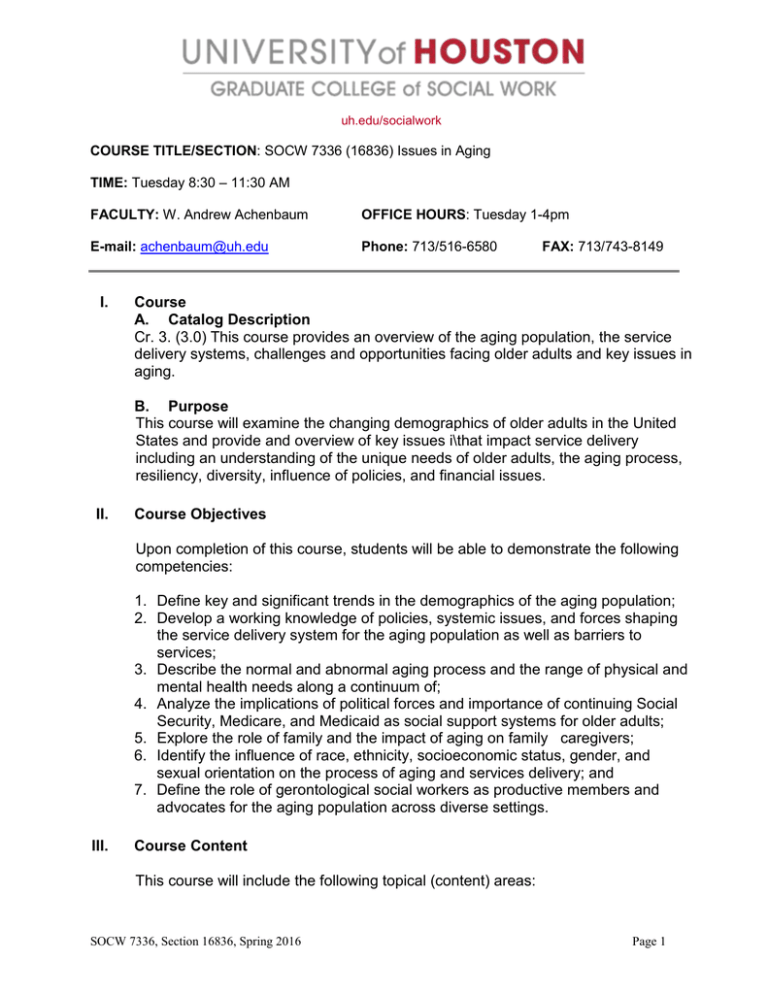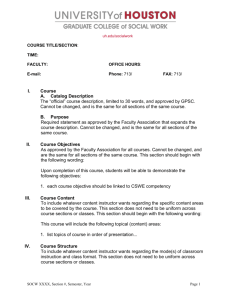Cr. 3. (3.0) This course provides an overview of the... delivery systems, challenges and opportunities facing older adults and key... I.
advertisement

uh.edu/socialwork COURSE TITLE/SECTION: SOCW 7336 (16836) Issues in Aging TIME: Tuesday 8:30 – 11:30 AM FACULTY: W. Andrew Achenbaum OFFICE HOURS: Tuesday 1-4pm E-mail: achenbaum@uh.edu Phone: 713/516-6580 I. FAX: 713/743-8149 Course A. Catalog Description Cr. 3. (3.0) This course provides an overview of the aging population, the service delivery systems, challenges and opportunities facing older adults and key issues in aging. B. Purpose This course will examine the changing demographics of older adults in the United States and provide and overview of key issues i\that impact service delivery including an understanding of the unique needs of older adults, the aging process, resiliency, diversity, influence of policies, and financial issues. II. Course Objectives Upon completion of this course, students will be able to demonstrate the following competencies: 1. Define key and significant trends in the demographics of the aging population; 2. Develop a working knowledge of policies, systemic issues, and forces shaping the service delivery system for the aging population as well as barriers to services; 3. Describe the normal and abnormal aging process and the range of physical and mental health needs along a continuum of; 4. Analyze the implications of political forces and importance of continuing Social Security, Medicare, and Medicaid as social support systems for older adults; 5. Explore the role of family and the impact of aging on family caregivers; 6. Identify the influence of race, ethnicity, socioeconomic status, gender, and sexual orientation on the process of aging and services delivery; and 7. Define the role of gerontological social workers as productive members and advocates for the aging population across diverse settings. III. Course Content This course will include the following topical (content) areas: SOCW 7336, Section 16836, Spring 2016 Page 1 1. 2. 3. 4. 5. Gerontology defined and social work as a field of practice; Demography, societal issues, and attitudes toward old age; Biopsychosocial theories and historical context of aging; Issues in home care and long term institutional caregiving Personal, interpersonal and political advocacy and empowerment for social and economic justice; 6. Diversity in aging and culturally competent practice 7. Ethical dilemmas in practice with elderly populations; 8. Community, family, friends and social support systems 9. Economics of aging, income distribution and government 10. Policies, politics and social service programs IV. Course Structure This class combines lectures, student led discussions, small group exercises, Active participation in class dialogue required V. Textbooks H. R. Moody & J. R. Sasser. AGING (8th ed.) P. Longman, BEST CARE ANYWHERE (3d ed.) VI. Course Requirements This section should identify the course assignments, including written assignments, projects, and exams, as well as due dates. It is suggested that any stipulations regarding late submissions be included here. A. Preparation, and Participation 50% Students are expected to read assigned material and come prepared to actively participate by contributing to class discussion throughout the semester. Two persons will be assigned a “controversy” to help lead weekly conversations. Initiative is always rewarded: feel free to circulate additional readings. B. Term Paper 50% Students will be required to select a topic, approved by the instructor. Papers must be 10-15 pages in length. C. Attendance Students are expected to attend class (two excused absences allowed; tardiness monitored), therefore credit is not factored into your grade. Excessive absences or tardiness will however result in lowering of final grade and student being dropped from course. Please see university policy on Incompletes as this will be adhered to as well. VII. Evaluation and Grading SOCW 7336, Section 16836, Spring 2016 Page 2 The following standard grading scale has been adopted for all courses taught in the college. A = A- = B+= B = B- = VIII. 96-100% of the points 92-95.9% 88-91.9% 84-87.9% 80-83.9% C+ = 76-79.9% C = 72-75.9% C- = 68-71.9% D = 64-67.9% F = Below 64% Policy on grades of I (Incomplete): The grade of "I" (Incomplete) is a conditional and temporary grade given when students are either (a) passing a course or (b) still have a reasonable chance of passing in the judgment of the instructor but, for non-academic reasons beyond their control have not completed a relatively small part of all requirements. Students are responsible for informing the instructor immediately of the reasons for not submitting an assignment on time or not taking an examination. Students must contact the instructor of the course in which they receive an “I” grade to make arrangements to complete the course requirements. Students should be instructed not to re-register for the same course in a following semester in order to complete the incomplete requirements. The grade of "I" must be changed by fulfillment of course requirements within one year of the date awarded or it will be changed automatically to an "F" (or to a "U" [Unsatisfactory] in S/U graded courses). The instructor may require a time period of less than one year to fulfill course requirements, and the grade may be changed by the instructor at any time to reflect work completed in the course. The grade of "I" may not be changed to a grade of W. IX. Policy on academic dishonesty and plagiarism Students are expected to demonstrate and maintain a professional standard of writing in all courses, do one’s own work, give credit for the ideas of others, and provide proper citation of source materials. Any student who plagiarizes any part of a paper or assignment or engages in any form of academic dishonesty will receive an “I” for the class with a recommendation that a grade of F be assigned, subsequent to a College hearing, in accordance with the University policy on academic dishonesty. Other actions may also be recommended and/or taken by the College to suspend or expel a student who engages in academic dishonesty. All presentations, papers and written assignments must be fully and properly referenced using APA style format (or as approved by the instructor), with credit given to the authors whose ideas you have used. If you are using direct quotes from a specific author (or authors), you must set the quote in quotation marks or use an indented quotation form. For all direct quotes, you must include the page number(s) in your text or references. Any time that you use more than four or five consecutive words taken from another author, you must clearly indicate that this is a direct quotation. Please consult the current APA manual for further SOCW 7336, Section 16836, Spring 2016 Page 3 information. Academic dishonesty includes using any other person’s work and representing it as your own. This includes (but is not limited to) using graded papers from students who have previously taken this course as the basis for your work. It also includes, but is not limited to submitting the same paper to more than one class. It also includes securing another person to complete any required activities, assignments, quizzes, papers, or exams in an online course, or in any on-line environment. If you have any specific questions about plagiarism or academic dishonesty, please raise these questions in class or make an appointment to see the instructor. This statement is consistent with the University Policy on Academic Dishonesty that can be found in your UH Student Handbook. X. Americans with Disabilities Statement The University of Houston System complies with Section 504 of the Rehabilitation Act of 1973 and the Americans with Disabilities Act of 1990, pertaining to the provision of reasonable academic adjustments/auxiliary aids for students with a disability. In accordance with Section 504 and ADA guidelines, each University within the System strives to provide reasonable academic adjustments/auxiliary aids to students who request and require them. If you believe that you have a disability requiring an academic adjustments/auxiliary aid, please contact the UH Center for Disabilities at 713-743-5400. WEEKLY ASSIGNMENTS January 19: Welcome and introduction January 27: Moody & Sasser [M/S], prolog and basic concepts 1 February 2: M/S, Controversy 2 and 3 February 9: M/S, Controversy 11 February 16: M/S, Concept 3 and controversy 8 February 23: M/S, Controversy 9 March 1: M/S, Concept SOCW 7336, Section 16836, Spring 2016 Page 4 March 8: M/S, Controversy 4 and 5 April 5: OPEN Discussion: Race, ethnicity, and class April 12: OPEN Discussion: Women, GBLTQ, Disable April 19: M/S, pp. 255=266 and controversy 7 April 26: M/S, Controversy 10 and12 A hard copy of your term paper is due in my office by noon on Friday, April 29 SOCW 7336, Section 16836, Spring 2016 Page 5

